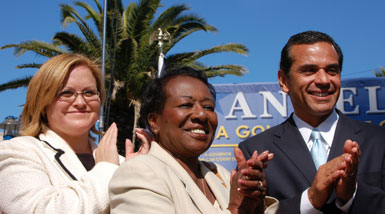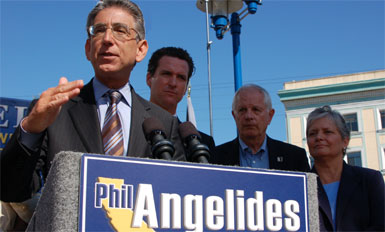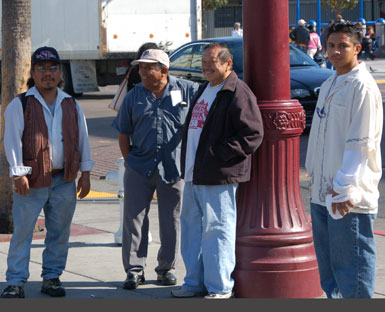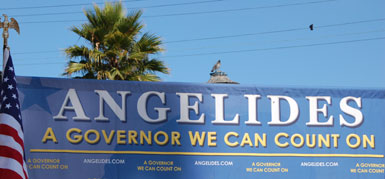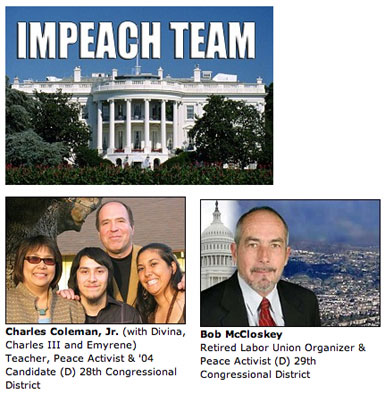(I saw this at janinsanfran’s own blog, Happening-Here, and asked her to cross-post it here. Thanks, Jan. – promoted by jsw)
Cross posted at Happening-Here
I am currently working with the Progressive Technology Project on curricula for community groups that want to involve themselves in elections. Don’t worry — we do try to make sure they know and observe the legal rules. In California, with proper reporting to the IRS and various election authorities, there are roles these groups can and should take working on ballot measures.
Our project is to get them into a more appropriate mindset for the tasks ahead and that takes some doing. We’ll be teaching some of the concepts in this post. Comments and suggestions are very welcome.
Community groups frequently come to electoral work with all sorts of misgivings, but seldom with an understanding of the most important fact about elections: elections are almost certainly different from anything your organization is ordinarily doing. You are about to play in a new game with unfamiliar rules.
It probably doesn’t look that way at first: after all, getting lots of people together, raising money, talking to the press, convincing people of your point of view — that’s what you do all the time. On the surface electoral work looks similar, but it usually is not. Here’s why:
1) Elections are a zero sum game, a war conducted by non-lethal means. One side wins and the other loses. Generally moral victories don’t count (though a good showing in a losing cause in a particular location can increase your influence with local politicians.) Elections are a fight, and not necessarily a fair one. Any legal tactic that wins votes is not only considered acceptable; among elections professionals, tactics that skirt legality and flaunt amorality sometimes win admiration. (Just look at Rove.)
This warlike thinking is out of sync with the mind set and culture of most grassroots advocacy and service groups and even with some quite assertive community organizations. People often come together precisely to reduce the amount of struggle in their lives; many of us are explicitly engaged in violence prevention or conciliation. We tend to work on bringing people together, not separating them out and driving them apart onto their respective “teams.” Yet separating friends from enemies must be done in an election. Enemies using the political process can and have launched attacks which assault our core values, such as tax cuts for the rich or Bush’s war. Once in the electoral arena, we only hurt ourselves if we fail to learn and appreciate the rules of this new game. Only after we have mastered the ordinary rules can we meaningfully decide how far we are willing to go in adopting unfamiliar and sometimes distasteful methods.
2) Good electoral organizing is wide, not deep: some might even say shallow and superficial. If your organization prides itself on having a nurturing culture, this can come hard.
Campaigns must move huge numbers of people in a very short time to perform one simple act: to cast a ballot our way. You will never have the time or resources to conduct deep organization or education with your voters, or even with all the people who work on the campaign.
With people reached as voters, all you have to do is make sure they are on your side and then make sure they vote.
With people reached as volunteers (some of them found while doing voter contact), all you have to do is make sure they are willing to carry out some phase of your program. At least initially, you don’t care why they are willing to work on your campaign. Obviously you want to listen to the volunteers you attract (you might learn a lot about what moves people to your side) and try to win volunteers to your political perspective. But mostly you simply have to recognize that you’ll be taking people as they come.
You can however, train your leaders to try to identify people you meet while working on the election who might become organization members of supporters — afterward!
3) Elections make strange bed fellows. The “wide not deep” principle applies to allied groups as well as individuals. Campaigns force you to work in broad coalitions where anyone who agrees with you on a particular issue must be brought to the table. Suddenly, you could find yourself on the same team as the police union or the Chamber of Commerce. For the duration of the campaign, on the one issue the campaign is about, these people become your friends. It can be unsettling.
But if you are going to work in elections, you don’t have much choice about who you work with. Sure, you would kick the KKK out of a coalition. But to get a majority of votes, you are almost certainly going to have to work with allies who are either unfamiliar or even distasteful. Your allies will not share all your values. But probably to assemble a majority of votes, there will be groups in your coalition that represent a rough community majority.
The better you understand the necessities of electoral organizing, the better able you’ll be to navigate: you’ll learn neither to make compromises with your new-found “friends” which will be destructive to your organization’s objectives after this round is over, nor, alternatively, to turn away genuine help which comes from an unexpected source. At times groups who could not be in the same room can work on parallel tracks toward a common goal. Knee jerk politics cannot stand these kinds of arrangements, but if you are going to work in elections, you have to learn not to make quick judgments about who is there with you.
4) Sometimes your friends are NOT your friends. Elections are the place in our society in which governmental power and its related perks get distributed. Community groups usually get involved in initiative campaigns because they care about issues, especially when issues on the ballot directly impact their members and constituencies. But most experienced players in the election game are there for power. Their own power. They may genuinely be on your side, but their interests in the situation are their own, not yours. And elections are usually their turf, not yours. This can lead them to behave in ways that are at best surprising to community groups and at worst can sabotage your efforts.
Progressive community groups especially need to be aware of three varieties of friends who are sometimes not friends: politicians, professional campaign consultants, and the trade unions.
Politicians: The primary business of most politicians is to get re-elected to their present office or elevated to a higher office. Sure, some of them routinely vote your way and a very few of them genuinely support you on the issues. You almost certainly know who they are. When confronted with a hostile ballot measure, many community groups instinctively turn to politicians for advice about how to maneuver in an election; after all, elections are what politicians do.
This impulse is not wrong. If they want to help, politicians have the contacts and staff, know the ropes (and the donors), and can command media attention to your side of an issue. But unless you are clearly winning, by which time you need them less, most politicians are going to be very careful about forcefully aligning themselves with you. For them, the costs and dangers are greater than the potential benefits. They risk pissing off your opponents and probably won’t lose the support of your supporters if they merely give lip service to your side.
Politicians’ lip service can be deceptive. They certainly don’t want you to know that they aren’t going to make a serious effort, so you may get lots of unfulfilled promises. It is appropriate and in your long-term interest to be very demanding of politicians who claim to back you; even if you don’t get much, politicians who discover during the heat of a campaign that you are not pushovers will treat your issues more respectfully later.
Everything said about politicians goes double for the Democratic Party. Look out for lip service to your issue that is not backed up by any helpful action. If fact, be on the look out for sabotage; if community groups really mobilized to be influential in elections, they could out-organize the moribund structures of the party in most areas.
Professional campaign consultants: These folks are literally in the business advising or running election campaigns. Some of them (probably a minority) are very good at their work. All of them who will talk to you at all (consultants don’t like dicey, highly charged, poorly compensated initiatives) will impress you with how much more they know about these things than you do.
Unless you have a lot of money, it is going to be very hard for you to make good use of the consultants you borrow or hire. Here are some things to think about when evaluating consultant advice:
Who is paying the consultant? If it is not you, you should be looking for the consultant’s advice to serve the interests of whoever is paying the bills — which may be slightly different from yours (see remarks on politicians and unions). In particular, the consultant’s next job will likely come from candidates, not you, so they are likely to be looking out for interests in addition to yours.
Does the consultant’s advice fit the issue and your community? Community groups may not know elections, but they do know why issues move their base to action. Consultants know how to assemble majorities for candidates; they don’t necessarily know the communities and the concerns you do. They are likely to think that media, money, and endorsements from politicians are the be-all and end-all of the campaign. You may know however that there are endorsements you can get from religious or professional leaders that would be far more influential on your issue. For example, an immigrant rights group that encourages citizenship will very likely have a far better idea of what moves new citizens to vote than a consultant. Don’t ever let a consultant run over your ideas, especially when yours come out of your genuine area of expertise. You might just have something to teach the consultant.
The Unions: Unions are the most powerful repository of political expertise (and the largest source of funds) on the progressive side of things in the current United States. Very often, they are the best friends we have. They are also not simple or easy allies for community groups.
You need to understand that although by and large the top leaders of many unions understand the value of community alliances and are mildly progressive, they have to worry about taking positions that seem far-out to their members. Many unions have very little interaction with their members apart from immediate work issues and consequently the members may well harbor all the prejudices found in the general public. Or union leaders may think their members have those attitudes — real back and forth between the members and leaders is rare. So union political leadership may be very cautious about getting involved with a controversial position advocated by a community group.
Moreover, unions that are good at the political game are usually heavily invested in particular politicians. They have put their money and their people into getting these politicians elected and they get concrete help for their members in return. These relationships, these sitting politicians, are much more important to the unions than anything you are working on. So though they may support you ideologically, they will always be looking out for the interests of their politicians. If your effort threatens the election or re-election of their candidates, look for lip service, token contributions, or well-meaning advice that amounts to downplaying the inflammatory content of your issues. Be warned and be grateful for what you do get that you can use.
Some of this material was first developed for use by Californians for Justice.
